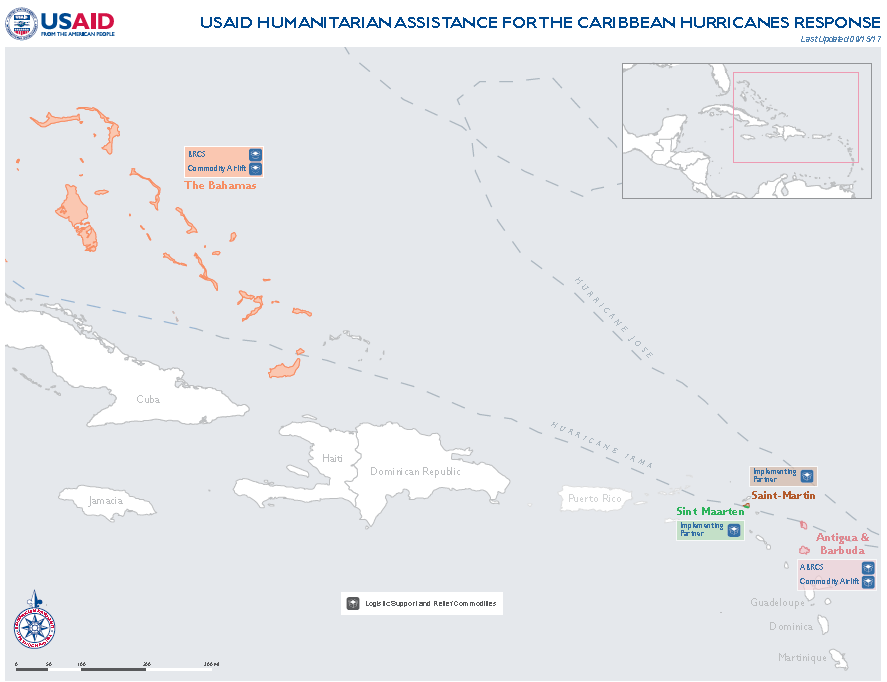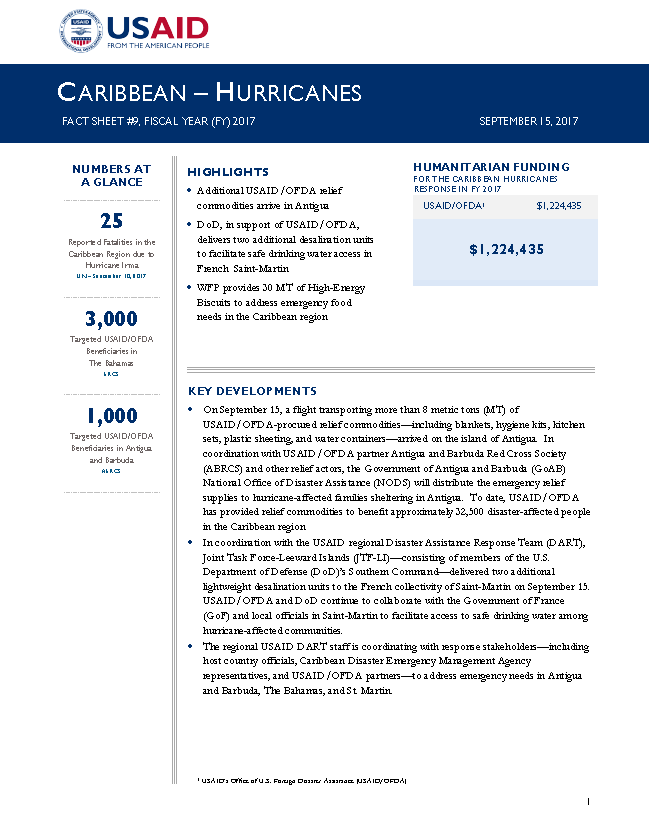Speeches Shim
September 15, 2017
Highlights
- Additional USAID/OFDA relief commodities arrive in Antigua.
- DoD, in support of USAID/OFDA, delivers two additional desalination units to facilitate safe drinking water access in French Saint-Martin
- WFP provides 30 MT of High-Energy Biscuits to address emergency food needs in the Caribbean region
Key Developments
On September 15, a flight transporting more than 8 metric tons (MT) of USAID/OFDA-procured relief commodities—including blankets, hygiene kits, kitchen sets, plastic sheeting, and water containers—arrived on the island of Antigua. In coordination with USAID/OFDA partner Antigua and Barbuda Red Cross Society (ABRCS) and other relief actors, the Government of Antigua and Barbuda (GoAB) National Office of Disaster Assistance (NODS) will distribute the emergency relief supplies to hurricane-affected families sheltering in Antigua. To date, USAID/OFDA has provided relief commodities to benefit approximately 32,500 disaster-affected people in the Caribbean region.
In coordination with the USAID regional Disaster Assistance Response Team (DART), Joint Task Force-Leeward Islands (JTF-LI)—consisting of members of the U.S. Department of Defense (DoD)’s Southern Command—delivered two additional lightweight desalination units to the French collectivity of Saint-Martin on September 15. USAID/OFDA and DoD continue to collaborate with the Government of France (GoF) and local officials in Saint-Martin to facilitate access to safe drinking water among hurricane-affected communities.
The regional USAID DART staff is coordinating with response stakeholders—including host country officials, Caribbean Disaster Emergency Management Agency representatives, and USAID/OFDA partners—to address emergency needs in Antigua and Barbuda, The Bahamas, and St. Martin.
Caribbean Hurricanes - Map #9 ![]() (pdf - 299k)
(pdf - 299k)
Numbers At A Glance
25
3,000
1,000
Humanitarian Funding
For the Caribbean Hurricanes in FY 2017
| USAID/OFDA | $1,224,435 |
Caribbean Hurricanes - Fact Sheet #9 ![]() (pdf - 130k)
(pdf - 130k)
REGIONAL
The UN World Food Program (WFP) is providing 30 MT of High-Energy Biscuits (HEBs)—sufficient to meet the immediate food needs of an estimated 17,000 people for three days—from its pre-positioned stocks in Haiti to address emergency food needs in the Caribbean region. The total includes 15 MT of HEBs delivered to the island of St. Martin—comprising Saint-Martin, a French overseas collectivity, and Sint Maarten, a constituent country of the Kingdom of the Netherlands—on September 14 to assist hurricane-affected people in Sint Maarten. WFP will position the remaining HEBs at a regional hub in Antigua, while relief actors conduct further assessments of emergency food needs throughout the eastern Caribbean region.
On September 15, the Pan American Health Organization (PAHO) and the UN World Health Organization (WHO) released a preliminary report on hurricane-related health needs in Anguilla, Antigua and Barbuda, the British Virgin Islands, Cuba, Saint Martin, Sint Maarten, and Turks and Caicos Islands. Priority needs include heightened epidemiological surveillance to mitigate the risk of increased infectious disease outbreaks; deployments of additional health care staff; and mental health support, particularly for people in evacuation shelters, according to PAHO and WHO. PAHO has deployed epidemiologists, health infrastructure experts, and other staff to affected islands and is coordinating with local health authorities and other response stakeholders to address the health needs of hurricaneaffected people.
ANTIGUA AND BARBUDA
Basic public services, including electricity, telecommunications, and access to health care and safe drinking water, remain unavailable on Barbuda, where Hurricane Irma destroyed at least 90 percent of building infrastructure, according to the GoAB and the UN. USAID/OFDA partner ABRCS is coordinating with NODS to collect additional data regarding the needs of the estimated 1,400 Barbudan evacuees sheltering in Antigua.
A flight transporting more than 8 MT of USAID/OFDA-procured relief commodities—including blankets, hygiene kits, kitchen sets, plastic sheeting, and water containers—arrived in Antigua on September 15. Together with the nearly 65 MT of USAID/OFDA relief items delivered the previous day, the commodities will benefit approximately 17,500 disaster-affected people. The total includes households in Antigua and Barbuda affected by Hurricane Irma, as well as pre-positioning for future disasters in the Caribbean region, including during the ongoing May-to-November hurricane season.
On September 14, DART staff in Antigua attended the first humanitarian coordination meeting, chaired by NODS, to discuss ongoing response efforts by UN agencies, NGOs, and other relief stakeholders. The DART continues to work with the GoAB and other response stakeholders to assess and respond to the priority needs of hurricane-affected households
THE BAHAMAS
A flight transporting more than 30 MT of USAID/OFDA-procured relief commodities—including blankets, hygiene kits, kitchen sets, plastic sheeting, and water containers—arrived in The Bahamas on September 14. The Government of the Commonwealth of the Bahamas National Emergency Management Agency, in coordination with relief partners, will manage distributions of the commodities—sufficient to meet the immediate needs of approximately 15,000 disaster-affected people—to hurricane-affected households, while pre-positioning additional commodities for future disasters in The Bahamas.
ST. MARTIN
As of September 14, gas stations had reopened across St. Martin, with fuel purchases limited to a maximum of $20 per resident per day, according to DART staff on the island. Multiple small grocery stores have also reopened in recent days, increasing household food access on St. Martin. Distributions of emergency relief supplies—including bottled water, baby food, canned beef, canned vegetables, milk powder, and other items—remaining ongoing, the DART reports.
Access to safe drinking water remains a priority need in areas of Saint-Martin, given hurricane-related damage to the French collectivity’s sole desalination plant, the UN reports. USAID/OFDA and JTF-LI are coordinating to import and install lightweight desalination units to facilitate access to safe drinking water in Saint-Martin. As of September 15, JTF-LI had delivered two additional desalination units to Saint-Martin, bringing the total number of USG-provided desalination units to four. Each two-unit site has the capacity to produce approximately 3,600 gallons—or nearly 13,630 liters—of safe drinking water per day. USAID/OFDA and DoD continue to collaborate with the Government of France (GoF) and local officials in Saint-Martin to facilitate access to safe drinking water among hurricane-affected communities.
INTERNATIONAL RESPONSE
As of September 15, the U.K. Department for International Development (DFID) had delivered more than 60 MT of emergency assistance—including food, shelter kits, safe drinking water, and water containers—to support hurricaneaffected families in the Caribbean region. A British military vessel carrying an additional 60 MT of emergency relief items—including hygiene kits, water containers, and water purification tablets—remained en route to the region as of September 15, according to DFID. In addition, British Prime Minister Theresa May recently announced an additional £25 million—nearly $34 million—in funding to support the Hurricane Irma response, bringing total U.K. assistance to £57 million, or nearly $77.5 million.
CONTEXT
Hurricane Irma—the strongest Atlantic hurricane on record—began affecting the eastern Caribbean in early September. On September 6, the hurricane made landfall over the island of Barbuda in the northeastern Caribbean before passing near The Bahamas, the Dominican Republic, and Haiti and making secondary landfall in Cuba on September 9. The hurricane brought destructive winds, heavy rainfall, and dangerous storm surge, resulting in at least 25 fatalities and causing significant infrastructure damage across the Caribbean region.
Between September 9 and 10, Hurricane Jose passed approximately 75 miles northwest of the island of St. Martin, causing less damage than anticipated in the Caribbean region. Damage and needs assessments following the passage of Hurricanes Irma and Jose remain ongoing.
On September 6, U.S. Chargé d’Affaires, a.i., Lisa A. Johnson issued a disaster declaration in response to the anticipated effects of Hurricane Irma in The Bahamas, and on September 7, U.S. Ambassador to Barbados and the Eastern Caribbean Linda S. Taglialatela issued a disaster declaration in response to Hurricane Irma and the anticipated effects of Hurricane Jose in Antigua and Barbuda. In response, USAID/OFDA is contributing an initial $100,000 each to the BRCS and the ABRCS.
On September 7, USAID activated a regional DART with staff in The Bahamas, Barbados, the Dominican Republic, and Haiti. USAID also stood up a Washington, D.C.-based RMT to coordinate the USG’s humanitarian response to the hurricanes.
On September 9, U.S. Embassy in Paris Chargé d’Affaires D. Brent Hardt issued a disaster declaration for the French Saint-Martin, and on September 10, U.S. Embassy in The Hague Chargé d’Affaires Shawn Crowley issued a disaster declaration for Sint Maarten due to the effects of Hurricane Irma and anticipated effects of Hurricane Jose. In response, USAID/OFDA contributed an initial $100,000 each for response activities in Saint-Martin and Sint Maarten.
PUBLIC DONATION INFORMATION
The most effective way people can assist relief efforts is by making cash contributions to humanitarian organizations that are conducting relief operations. A list of humanitarian organizations that are accepting cash donations for disaster responses around the world can be found at www.interaction.org.
USAID encourages cash donations because they allow aid professionals to procure the exact items needed (often in the affected region); reduce the burden on scarce resources (such as transportation routes, staff time, and warehouse space); can be transferred very quickly and without transportation costs; support the economy of the disaster-stricken region; and ensure culturally, dietary, and environmentally appropriate assistance.
More information can be found at: USAID Center for International Disaster Information: www.cidi.org or +1.202.661.7710. Information on relief activities of the humanitarian community can be found at www.reliefweb.int.



Comment
Make a general inquiry or suggest an improvement.